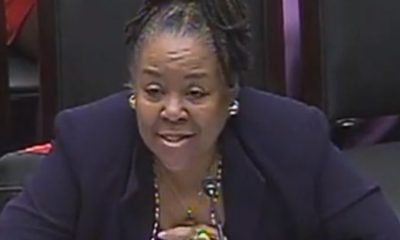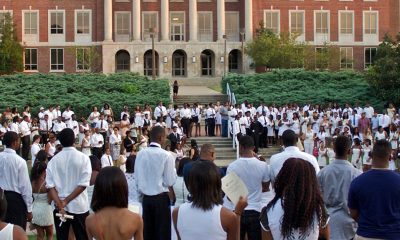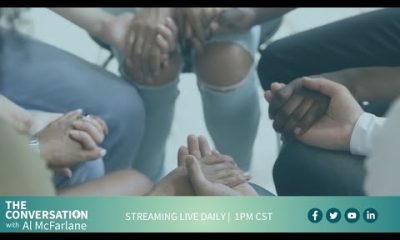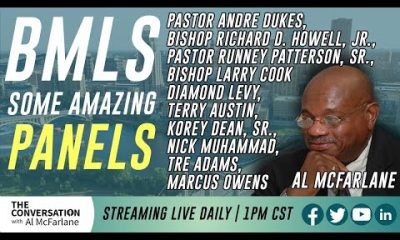Community
Sydney Roberts: New ASUC president shares her goals, inspirations
From a young age, I participated in the Los Angeles Women’s March and read Audre Lorde religiously. The summer before my senior year I took part in Girls State, a week-long immersive summer program that teaches 500 young women from different corners of the nation how to govern imitation cities and states.
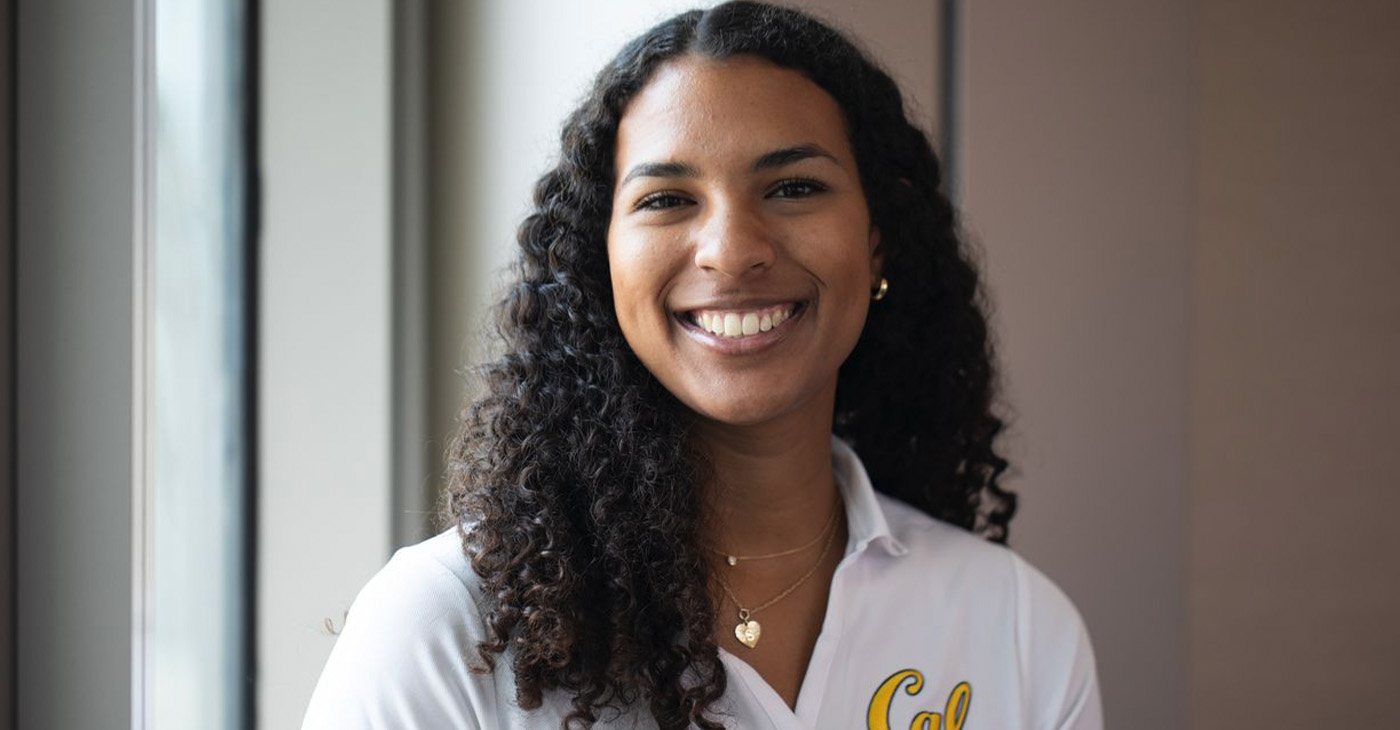
Her first goal is to increase students’ sense of belonging on campus, especially for those who are underrepresented.
By Gretchen Kell
UC Berkeley News
I’m from Long Beach, California, an incredibly diverse and urban coastal city. It is truly a melting pot of cultures, with a large and vibrant settlement of Filipinx and Hispanic people. My friends throughout middle and high school came from these backgrounds, among others. They taught me how beautiful of an experience it is to foster close relationships with people from different backgrounds.
I grew up in a household with my single mom and twin sister. My father joined the Marines right after high school and now works for the U.S. Postal Service. My mother went to college and nursing school and is a public health nurse for the city of Long Beach, specifically working with houseless senior citizens. She is a strong feminist who always encouraged us to pursue higher education and instilled in us that education is key to personal development and professional opportunity.
Growing up in a female-led household also taught me the value of independence. My mother sacrificed a lot to ensure my sister and I had myriad opportunities. Her selflessness shaped my idea of leadership. She went above and beyond to give others more and create joy.
From a young age, I participated in the Los Angeles Women’s March and read Audre Lorde religiously. The summer before my senior year I took part in Girls State, a week-long immersive summer program that teaches 500 young women from different corners of the nation how to govern imitation cities and states.
In the Long Beach Unified School District, I found my passion for research. Although underfunded, like most public systems, I was able to take an AP seminar and AP research capstone. I focused my research on racial profiling after 9/11 and the different opinions about patriotism among baby boomers, millennials and Generation X.
The murder of George Floyd at the end of my senior year was a real turning point for me. People’s reaction to the Black Lives Matter Movement that resurfaced during the summer of 2020 changed my perception of politics and society. I was consumed by grief, but soon turned my emotions into political passion. I wanted to revolutionize how people learned about injustice. I used my social media presence to educate people on the prevalence of anti-Blackness and how to have tough conversations with family members with different ideologies.
I visited UC Berkeley the summer before my senior year of high school. It was my dream school. I was in awe of Cal’s history and culture. Learning that members of the Black Panther Party spoke here, and that the Free Speech Movement ignited here, inspired me. I wanted to be surrounded by changemakers and in a city with a strong culture.
I was on campus to attend the Berkeley Summer Experience, a weekend-long program that paired low-income or underrepresented students with admissions counselors to receive advice on their UC college applications. Although my test scores and leadership roles made me a competitive applicant, I was a student from an underfunded public high school and a family with only one college graduate. I attribute that program to why I was accepted to Cal.
I began attending Berkeley in the fall of 2020. My first year at Berkeley was characterized by the COVID-19 pandemic. It was a struggle to find community, but the ASUC and my sorority, Alpha Phi, aided my endeavor to make personal relationships.
In the ASUC, I served as chief of staff to Chaka Tellem, student body president for an unprecedented two terms. We created an environmental justice education program, sending students to local middle and elementary schools to teach younger generations about sustainability.
We negotiated the biggest discount with Princeton Review for students to receive 20% off all pre-professional test prep review materials. We designed a mentorship program for first-generation, low-income and underrepresented students with the Cal Alumni Association thats fully funded and staffed and has hundreds of participants.
I became chapter president of Alpha Phi in 2021. I aimed to increase involvement, diversify membership and foster belonging. Knowing what it was like to be a Black woman in a predominately white space made me determined to implement initiatives that would transform our chapter into a more inclusive space.
We celebrated culturally significant holidays like Juneteenth, Latinx Heritage Month, Diwali and more. I started an international night, where members decorated a part of our chapter room with items or foods special to their heritage. I also made financial and housing decisions that enabled flexibility for members in need.
This year, I’m a senior, graduating in the spring of 2024, and I feel very honored to be in the role of ASUC president. The presidential race was heavily contested, with five candidates. I ran on platforms of multiculturalism, environmentalism, career readiness, student wellness and campus climate.
My first goal as president is to increase students’ sense of belonging on campus, especially students who have historically felt excluded from higher education. Black students on this campus need more Black students, faculty, and staff.
It’s extremely hard to be the one or one of few Black people in your class, to have no professors who look like you or understand your background, or to know that there are few people within university administrative roles who share the experiences of the Black community.
I took a public policy course during my sophomore year where a small cohort of students went to the Alameda Probation Office to interview formerly incarcerated individuals and probation officers to research re-entry resources.
I also spent the summer before my junior year participating in the SURF SMART program as a research fellow for Caleb Dawson, a Ph.D. candidate in the School of Education. A snippet of our research focus was understanding why Black students, faculty and staff pursue higher education or a career at Cal, and if they felt they had adequate support systems here.
Another goal as ASUC president is to increase pre-professional and academic opportunities on campus. I want all students to feel career-ready before graduation. A final goal is connecting students with the abundance of organizations and departments on campus that assist with their basic needs. Some of the biggest struggles facing students are financial stability, housing security and food security.
This past summer, I gained additional skills in politics working for the Democratic Senatorial Campaign Committee in Wash., D.C., as a research intern in our Cal in the Capitol program. After graduation, I hope to work on a political campaign for the 2024 election or intern for a political consulting or research firm or committee. Later in life, I’m interested in returning to school for a master’s in public policy or/and a J.D.
The most popular question I get today is what my biggest goal is, now that I’m student body president. As a Black woman, I know this university wasn’t designed for me, and there are people in this world who don’t want me to succeed. So empowering others who look like me to take on positions of power and mentoring them in a meaningful and impactful way so they may go on to lead is my greatest hope.
Younger students, many other Black women, have come up to me and expressed how inspiring it is to see a Black woman at the forefront of this university. I tell them, “You’re next.”
Activism
Oakland Post: Week of April 24 – 30, 2024
The printed Weekly Edition of the Oakland Post: Week of April 24 – 30, 2024

To enlarge your view of this issue, use the slider, magnifying glass icon or full page icon in the lower right corner of the browser window. ![]()
Alameda County
DA Pamela Price Stands by Mom Who Lost Son to Gun Violence in Oakland
Last week, The Post published a photo showing Alameda County District Attorney Pamela Price with Carol Jones, whose son, Patrick DeMarco Scott, was gunned down by an unknown assailant in 2018.

Publisher’s note: Last week, The Post published a photo showing Alameda County District Attorney Pamela Price with Carol Jones, whose son, Patrick DeMarco Scott, was gunned down by an unknown assailant in 2018. The photo was too small for readers to see where the women were and what they were doing. Here we show Price and Jones as they complete a walk in memory of Scott. For more information and to contribute, please contact Carol Jones at 510-978-5517 at morefoundation.help@gmail.com. Courtesy photo.
City Government
Vallejo Welcomes Interim City Manager Beverli Marshall
At Tuesday night’s Council meeting, the Vallejo City Council appointed Beverli Marshall as the interim city manager. Her tenure in the City Manager’s Office began today, Wednesday, April 10. Mayor Robert McConnell praised Marshall’s extensive background, noting her “wide breadth of experience in many areas that will assist the City and its citizens in understanding the complexity of the many issues that must be solved” in Vallejo.

Special to The Post
At Tuesday night’s Council meeting, the Vallejo City Council appointed Beverli Marshall as the interim city manager. Her tenure in the City Manager’s Office began today, Wednesday, April 10.
Mayor Robert McConnell praised Marshall’s extensive background, noting her “wide breadth of experience in many areas that will assist the City and its citizens in understanding the complexity of the many issues that must be solved” in Vallejo.
Current City Manager Michael Malone, whose official departure is slated for April 18, expressed his well wishes. “I wish the City of Vallejo and Interim City Manager Marshall all the best in moving forward on the progress we’ve made to improve service to residents.” Malone expressed his hope that the staff and Council will work closely with ICM Marshall to “ensure success and prosperity for the City.”
According to the Vallejo Sun, Malone stepped into the role of interim city manager in 2021 and became permanent in 2022. Previously, Malone served as the city’s water director and decided to retire from city service e at the end of his contract which is April 18.
“I hope the excellent work of City staff will continue for years to come in Vallejo,” he said. “However, recent developments have led me to this decision to announce my retirement.”
When Malone was appointed, Vallejo was awash in scandals involving the housing division and the police department. A third of the city’s jobs went unfilled during most of his tenure, making for a rocky road for getting things done, the Vallejo Sun reported.
At last night’s council meeting, McConnell explained the selection process, highlighting the council’s confidence in achieving positive outcomes through a collaborative effort, and said this afternoon, “The Council is confident that by working closely together, positive results will be obtained.”
While the search for a permanent city manager is ongoing, an announcement is expected in the coming months.
On behalf of the City Council, Mayor McConnell extended gratitude to the staff, citizen groups, and recruitment firm.
“The Council wishes to thank the staff, the citizens’ group, and the recruitment firm for their diligent work and careful consideration for the selection of what is possibly the most important decision a Council can make on behalf of the betterment of our City,” McConnell said.
The Vallejo Sun contributed to this report.
-

 Activism4 weeks ago
Activism4 weeks agoOakland Post: Week of March 27 – April 2, 2024
-

 #NNPA BlackPress4 weeks ago
#NNPA BlackPress4 weeks agoBeloved Actor and Activist Louis Cameron Gossett Jr. Dies at 87
-

 Community1 week ago
Community1 week agoFinancial Assistance Bill for Descendants of Enslaved Persons to Help Them Purchase, Own, or Maintain a Home
-

 Activism3 weeks ago
Activism3 weeks agoOakland Post: Week of April 3 – 6, 2024
-

 Business1 week ago
Business1 week agoV.P. Kamala Harris: Americans With Criminal Records Will Soon Be Eligible for SBA Loans
-

 Activism2 weeks ago
Activism2 weeks agoOakland Post: Week of April 10 – 16, 2024
-

 Community1 week ago
Community1 week agoAG Bonta Says Oakland School Leaders Should Comply with State Laws to Avoid ‘Disparate Harm’ When Closing or Merging Schools
-

 Community6 days ago
Community6 days agoOakland WNBA Player to be Inducted Into Hall of Fame



